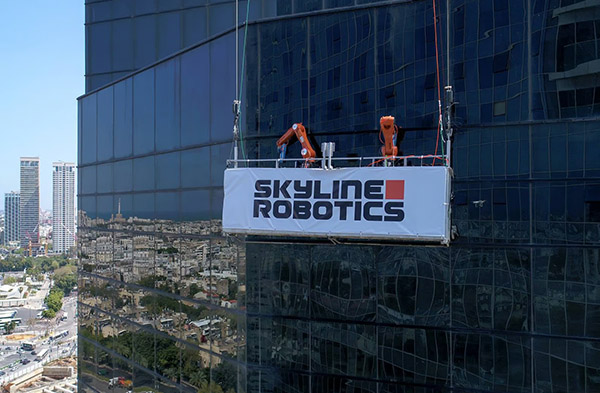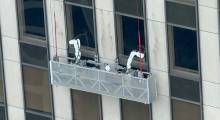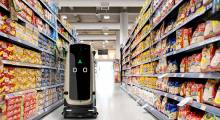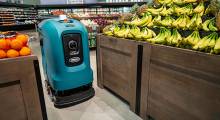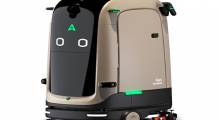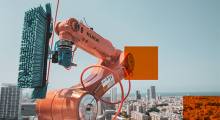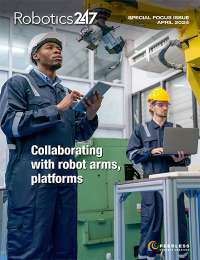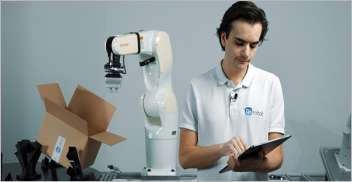More robots may soon be just outside your window. Skyline Robotics this week announced the completion of a $3.35 million funding round that it plans to use for its ongoing 2023 businesss operations plan. The company has developed OZMO, which it claimed is “the world's first high-rise window-cleaning robot.”
“Despite a difficult economy, Skyline Robotics remains an attractive target to investors and was able to raise funding at more attractive terms than in previous rounds, which is uncommon in today’s market,” said Michael Brown, CEO of Skyline Robotics, in a release. “This vote of investor confidence is based on validated milestones the company continues to achieve, as well as our overall business approach, proven go-to-market strategy, and demand for our robotics solution.”
Skyline Robotics said OZMO “is disrupting the $40 billion window cleaning industry as a safer, more efficient, and more effective alternative to humans.” The company, which has offices in New York and Tel Aviv, Israel, is working to automate all types of work at heights, starting with window cleaning.
OZMO applies robotics, AI to skyscrapers
OZMO combines artificial intelligence, machine learning, and computer vision with advanced robotics and sensors to tackle pressing industry challenges including labor shortages and worker safety, according to Skyline.
The company recently received patents in Japan and Singapore for its window-cleaning system. Skyline has already deployed its first robots in New York City and said it is planning to enter markets in various major cities globally.
“We have 4G, gauges for stabilization, and water and power lines on the rooftop, and a KUKA KR Agilus 2 robot arm in the standard basket,” said Ross Blum, president and chief operating officer of Skyline Robotics. “There are not many waterproof six-axis arms on the market, and the IP rating is pretty important, since it can access the same portions of a window as a human arm.”
“We used AIRSKIN safety technology to make it a collaborative robot,” he told Robotics 24/7. “The New York Department of Labor still wants a person in the basket.”
OZMO also has force torque sensors and distance lasers to ensure that brushes and squeegees do not damage façades, said Blum. A lidar from Ouster maps façades, even when they are transparent or reflective.
“It's able to filter out noise from the sun's position and localize where each window exists,” he explained. “It then tells the robot to go clean betweeen the lines.”
Beneath the robot arm is compute and an inertial measurement unit (IMU) so that it can react in real time to environmental conditions such as gusts of wind. The path planning recalculates 250 times per second for basket stabilization, Blum said.
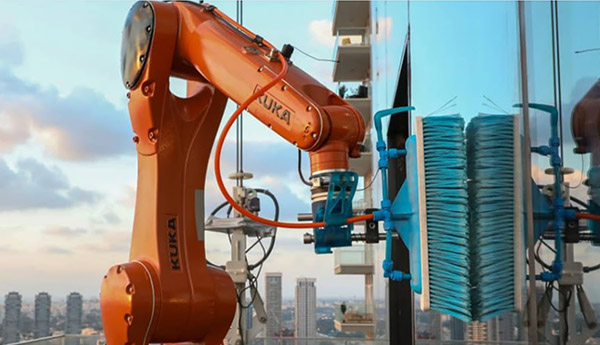
Funding to fuel business model
Skyline Robotics successfully obtained its latest funding through a SAFE (Simple Agreement for Future Equity) Note. The company has raised a total of $12 million to date.
“Between the company's founding in 2017 and 2020, it hadn't generated any revenue,” said Blum. “We first had to demonstrate the value to potential users.”
“We started meeting with not just window cleaning firms in New York, but also developers and property managers as we developed our strategy,” he recalled. “Our primary partner profile is a service provider like Platinum. Real estate is really relationship-driven, and Platinum offers about 15 services and has been working with some of its customers for decades.”
Skyline offered Platinum different payment models, such as per square foot or a monthly fee, but it chose robotics as a service (RaaS) as a “salary,” Blum said. In addition, Skyline had to work with union shops, which could have been concerned about automation, he noted.
“This is workforce augmentation rather than replacement. As of 2022, 76% of window cleaners are over 40, and you could be hanging 1,000 feet up at angles of 40 to 120 degrees,” said Blum. “Labor realized that it could get training with robotics and thus higher hourly wages.”
“We're still doing a ton of education and engagement for the value chain, but more and more people are coming to us looking for automated window cleaning, which they already understood in principle,” he said. “Window cleaning is a great entry point, but at the end of the day, we want to 'own the façade' and use optical scan and analytics for inspection and preventive maintenance.”
About the Author
Follow Robotics 24/7 on Linkedin
Article topics
Email Sign Up

